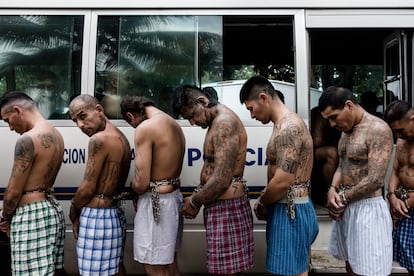Leaked database reveals prison abuses under El Salvador’s state of emergency
The records, to which Human Rights Watch has had access, have exposed overcrowding, deaths in custody and the detention of over 1,000 minors including children as young as 12


Extreme overcrowding, violations of due process, a lack of safeguards, mass detentions and deaths in custody: the flip side of President Nayib Bukele’s strategy to crack down on El Salvador’s gangs has been exposed in a leaked database accessed by Human Rights Watch (HRW). These records detail “large-scale abuses” in the Central American country’s jails following the state of emergency decreed in March 2022. While the sweeping powers afforded to security forces under the measure have led to the arrest of more than 60,000 people over the last 10 months and Bukele has succeeded in his aim of weakening the two main criminal organizations in El Salvador - the Mara Salvatrucha-13 and Barrio-18 - reports of human rights abuses have multiplied.
These findings have served to confirm what HRW and the Salvadoran NGO Cristosal have been warning about for some time. The database, attributed by a trusted source to the Ministry of Justice and Public Safety, contains the names of people prosecuted between March and August 2022. In a statement released on Friday, HRW said the documentation provided evidence that “thousands of people, including hundreds of children, have been arrested and charged with broadly defined crimes that violate detainees’ basic due process guarantees and undermine prospects of justice for victims of gang violence.”
The documentation, which was cross-referenced by HRW with other sources, records the deaths of 32 people up to August, mostly in the Mariona and Izalco prisons. In November, the authorities referred to the deaths of another 58 detainees without clarifying the circumstances under which they occurred. The HRW report notes that 39,000 detainees were charged with the crime of “unlawful association” and over 8,000 of membership in a “terrorist organization,” yet “many fewer people had been charged with violent crimes. 148 people, or less than 0.3 percent of the detainees, were charged with homicide and 303 people, or less than 0.6 percent, were charged with sexual assault.”
The crime of unlawful association in El Salvador does not only apply to active gang members but also to anyone who receives “indirect benefit” from gang activity, HRW said. “The use of these broadly defined crimes opens the door to arbitrary arrests of people with no relevant connection to gangs, and does little to ensure justice for violent gang abuses, such as killings and rape.”
According to official data, El Salvadoran security forces have detained 61,000 people since the state of emergency entered into force. Of these, 3,000 have been released, in many cases under parole, the HRW report said. By the end of August, 1,082 minors had been sent to pre-trial detention, of whom 21 were aged 12 or 13. A law passed when the state of emergency was decreed lowered from 16 to 12 the age of criminal responsibility for children accused of gang-related crimes.
“This leaked database points to serious human rights violations committed during the state of emergency,” said Tamara Taraciuk Broner, acting Americas director at HRW. “According to the data, Salvadoran authorities have inhumanely packed detainees, including hundreds of children, in crowded detention sites, while doing very little to ensure victims’ access to justice for gang violence.” Up to August 2022, the prison population in El Salvador increased to 86,000, after 50,000 people were sent to pre-trial detention. In February 2021, according to official data, the country’s penitentiaries had a total capacity of 30,000. The leaked information also states that 7,900 women have been ordered into pre-trial detention under the state of emergency, which the HRW report notes is “double the total number in jail in El Salvador as of February 2021.”
This situation has been compounded by poor oversight of the Bukele government, harassment of the press and human rights organizations, and the obstacles thrown up by the authorities for accessing information of public interest. As such, HRW and Cristosal have called on the Bukele administration to “replace the state of emergency with a sustainable and rights-respecting strategy to address gang violence and protect the population from gang abuses. The strategy should include tackling high levels of poverty and social exclusion, and focusing on prosecutions of higher-level gang leaders.”
Sign up for our weekly newsletter to get more English-language news coverage from EL PAÍS USA Edition
Tu suscripción se está usando en otro dispositivo
¿Quieres añadir otro usuario a tu suscripción?
Si continúas leyendo en este dispositivo, no se podrá leer en el otro.
FlechaTu suscripción se está usando en otro dispositivo y solo puedes acceder a EL PAÍS desde un dispositivo a la vez.
Si quieres compartir tu cuenta, cambia tu suscripción a la modalidad Premium, así podrás añadir otro usuario. Cada uno accederá con su propia cuenta de email, lo que os permitirá personalizar vuestra experiencia en EL PAÍS.
¿Tienes una suscripción de empresa? Accede aquí para contratar más cuentas.
En el caso de no saber quién está usando tu cuenta, te recomendamos cambiar tu contraseña aquí.
Si decides continuar compartiendo tu cuenta, este mensaje se mostrará en tu dispositivo y en el de la otra persona que está usando tu cuenta de forma indefinida, afectando a tu experiencia de lectura. Puedes consultar aquí los términos y condiciones de la suscripción digital.








































